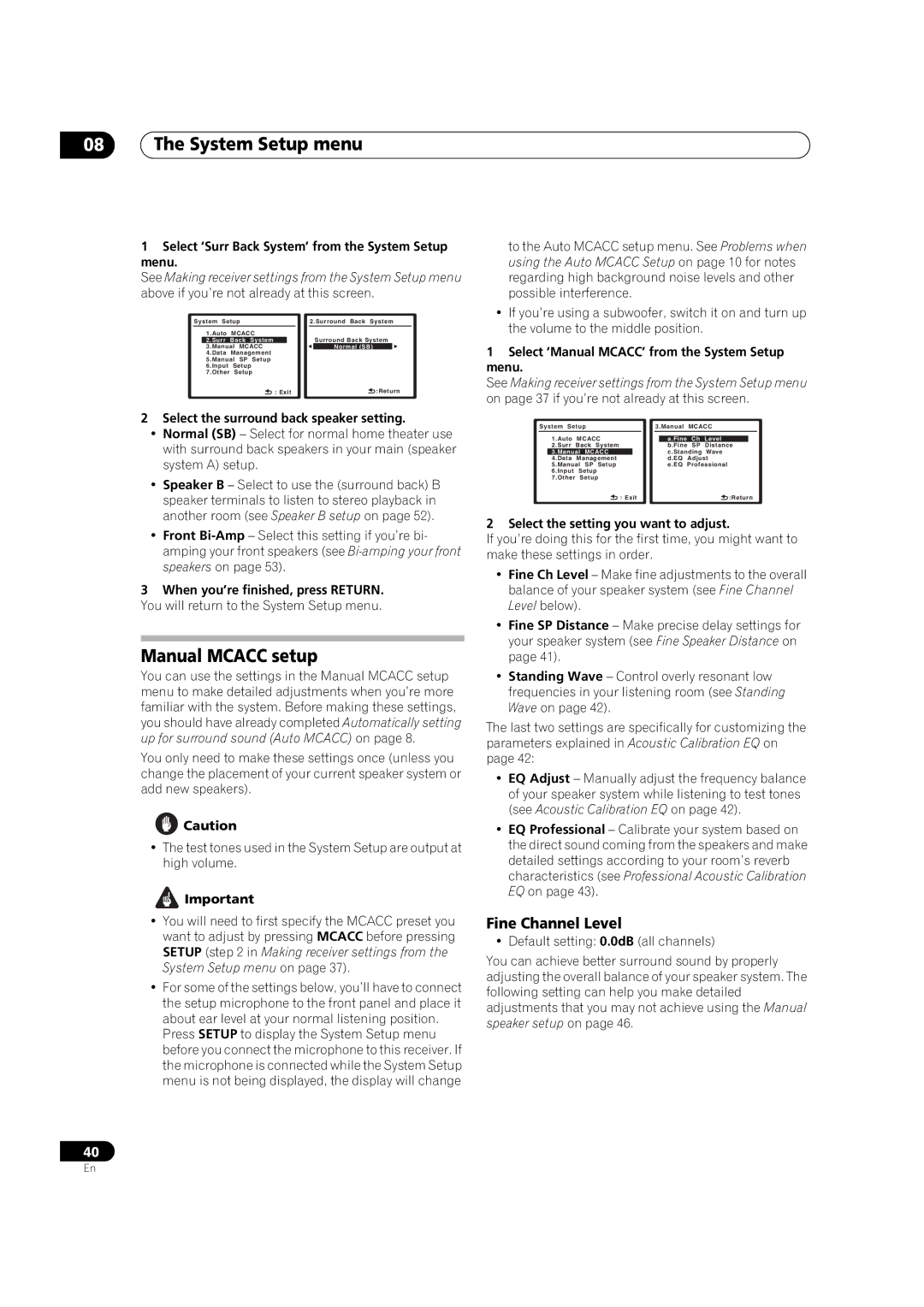
08The System Setup menu
1Select ‘Surr Back System’ from the System Setup menu.
See Making receiver settings from the System Setup menu above if you’re not already at this screen.
System Setup |
| 2.Surround Back System | |||||
| 1.Auto | MCACC |
|
| Surround Back System | ||
| 2.Surr | Back System |
|
|
| ||
| 3.Manual MCACC |
|
|
| Normal (SB) |
| |
| 4.Data | Management |
|
|
|
| |
| 5.Manual SP Setup |
|
|
|
| ||
| 6.Input | Setup |
|
|
|
| |
| 7.Other | Setup |
|
|
|
| |
|
| : Exit |
|
| :Return | ||
2Select the surround back speaker setting.
•Normal (SB) – Select for normal home theater use with surround back speakers in your main (speaker system A) setup.
•Speaker B – Select to use the (surround back) B speaker terminals to listen to stereo playback in another room (see Speaker B setup on page 52).
•Front
3When you’re finished, press RETURN.
You will return to the System Setup menu.
Manual MCACC setup
You can use the settings in the Manual MCACC setup menu to make detailed adjustments when you’re more familiar with the system. Before making these settings, you should have already completed Automatically setting up for surround sound (Auto MCACC) on page 8.
You only need to make these settings once (unless you change the placement of your current speaker system or add new speakers).
![]() Caution
Caution
•The test tones used in the System Setup are output at high volume.
![]() Important
Important
•You will need to first specify the MCACC preset you want to adjust by pressing MCACC before pressing SETUP (step 2 in Making receiver settings from the System Setup menu on page 37).
•For some of the settings below, you’ll have to connect the setup microphone to the front panel and place it about ear level at your normal listening position.
Press SETUP to display the System Setup menu before you connect the microphone to this receiver. If the microphone is connected while the System Setup menu is not being displayed, the display will change
to the Auto MCACC setup menu. See Problems when using the Auto MCACC Setup on page 10 for notes regarding high background noise levels and other possible interference.
•If you’re using a subwoofer, switch it on and turn up the volume to the middle position.
1Select ‘Manual MCACC’ from the System Setup menu.
See Making receiver settings from the System Setup menu on page 37 if you’re not already at this screen.
System Setup |
| 3.Manual | MCACC | ||||||
| 1.Auto | MCACC |
|
|
|
|
|
| |
|
|
| a.Fine | Ch | Level | ||||
| 2.Surr | Back System |
|
| b.Fine | SP | Distance |
| |
| 3.Manual MCACC |
|
|
| c.Standing Wave | ||||
| 4.Data | Management |
|
|
| d.EQ | Adjust | ||
| 5.Manual SP Setup |
|
| e.EQ | Professional | ||||
| 6.Input | Setup |
|
|
|
|
|
| |
| 7.Other | Setup |
|
|
|
|
|
| |
|
| : Exit |
|
|
|
| :Return | ||
2 Select the setting you want to adjust.
If you’re doing this for the first time, you might want to make these settings in order.
•Fine Ch Level – Make fine adjustments to the overall balance of your speaker system (see Fine Channel Level below).
•Fine SP Distance – Make precise delay settings for your speaker system (see Fine Speaker Distance on page 41).
•Standing Wave – Control overly resonant low frequencies in your listening room (see Standing Wave on page 42).
The last two settings are specifically for customizing the parameters explained in Acoustic Calibration EQ on page 42:
•EQ Adjust – Manually adjust the frequency balance of your speaker system while listening to test tones (see Acoustic Calibration EQ on page 42).
•EQ Professional – Calibrate your system based on the direct sound coming from the speakers and make detailed settings according to your room’s reverb characteristics (see Professional Acoustic Calibration EQ on page 43).
Fine Channel Level
• Default setting: 0.0dB (all channels)
You can achieve better surround sound by properly adjusting the overall balance of your speaker system. The following setting can help you make detailed adjustments that you may not achieve using the Manual speaker setup on page 46.
40
En
